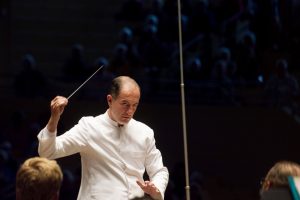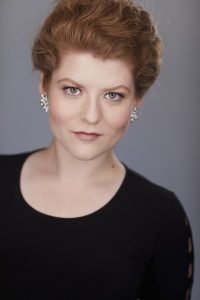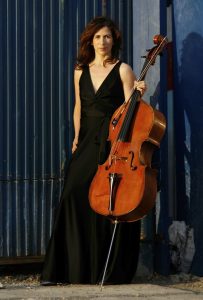


The Chautauqua Symphony Orchestra’s concert this evening will last less than two hours — but it will explore eternity.
At 8:15 p.m. Thursday, August 15 in the Amphitheater, the CSO will perform Gustav Mahler’s Symphony No. 4, an orchestral and vocal exploration of heaven. The concert will also feature London-based composer Anna Clyne’s new concerto for cello and orchestra, “DANCE.”
Mahler’s Symphony No. 4 is made up of four movements that follow a child’s death and afterlife. Although the subject matter begins in a dark place, CSO Conductor and Music Director Rossen Milanov said the piece is unforgettable.
“I envy the people who haven’t heard Mahler 4 and can hear it for the first time,” Milanov said. “It’s one of those pieces that you never forget.”
Renaissance-era artists often portrayed death as a skeletal figure playing the violin. Milanov said the CSO will echo this imagery with its instruments.
“In the second movement, the concertmaster will use two violins,” Milanov said, “one normal, and one which is tuned much higher. In many legends, Death itself played a violin — it would take you away, playing the sweet sound of a violin. So in that way, the final resolution of the symphony is already predicted somewhat. Death itself appears, taking the shape of a more awkward and shrill-sounding violin.”
Soprano Rebekah Howell will perform with the CSO in the final movement of the piece, which explores a child’s idea of heaven. Howell said this movement is a sensory, kinetic experience; the lyrics describe plentiful food, dancing saints and angelic music.
“It’s not at all what you would think of heaven, but it’s exactly what someone would think of when describing a simple, uncluttered life,” Howell said. “It makes you reconsider how blessed we are when we have those simple things: food to eat, things to do, fish to catch in the river.”
The symphony’s vocal portion ends with an awestruck description of heavenly music.
“At the very end, there’s a long, beautiful symphonic section that brings back a motif from earlier,” Howell said. “The ending stanza talks about the music in heaven — how there’s nothing else that can compare with it.”
The symphony ends with a quiet orchestral portion, Milanov said.
“The last miracle it describes is this beautiful celestial music in heaven, and that’s how the symphony finishes: this extremely quiet wave of sound that goes into eternity,” Milanov said.
The concert will open with Clyne’s new piece, “DANCE.” The concerto is based on a poem by medieval writer Jalāl ad-Dīn Muhammad Balkhī, often known as Rumi. The concerto’s five short movements are based on the five lines of Rumi’s poem:
“Dance, when you’re broken open. / Dance, if you’ve torn the bandage off. / Dance in the middle of the fighting. / Dance in your blood. / Dance when you’re perfectly free.”
Clyne wrote the piece for cellist Inbal Segev, an award-winning alumna of the Yale School of Music and the Juilliard School of Music.
Segev said “DANCE” explores the poem’s emotional qualities through a variety of styles.
“The first movement starts in a very special way; the cello sounds like a violin,” Segev said. “It plays very high and very ethereal, and I’ve never seen that in a concerto before. Then it’s kind of grungy and virtuosic and rougher in the second movement. The third is very spiritual, and the last two are more virtuosic — these beautiful, romantic melodies.”
Segev said new music has an important place in modern orchestra performance.
“(Classical compositions) are beautiful works, and I think we will always love them — as long as there are humans on Earth, we’ll play Bach,” Segev said. “But I think that, to move the world forward, we have to support composers and play new works.”




